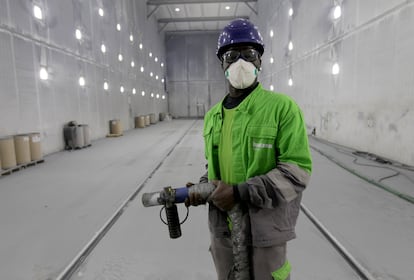In Spain, legal change helps young at-risk migrants get their first job contracts
A month after new regulations went into effect, over 4,500 foreign-born youths have applied for residency and work papers
The enthusiastic director of Haizea Wind, Borja Zárraga, has the wind in his sails. The Basque company, which manufactures wind turbines for export to northern Europe’s huge wind farms, already has a turnover of €200 million a year but now the European Union’s commitment to renewable energies has provided an unprecedented opportunity for expansion.
On the back of this, Zárraga plans to increase his workforce and double the factory’s capacity. His only problem is that he cannot find the workers he needs. “If we want to grow, we need very specifically trained and educated professionals,” he says. “We can look for them elsewhere, but we intend to get young people in at the bottom who are eager to learn and work their way up to become professionals. It doesn’t matter where they come from.”
Gathered in the meeting room where Zárraga works on the company’s strategy are Othmane, Bandja and Mohamed, three 20-year-olds from Morocco, Guinea and the Ivory Coast. They all arrived in Spain on a migrant boat as kids, and just a few months ago none of them had the paperwork that would allow them to work legally, nor much hope of getting it. But now that Spain has made a change to immigration legislation, they and 10 other young migrants are about to join Haizea Wind’s staff of 1,000 employees. Having taken various vocational training courses, they will earn €20,000 gross per year as painting and welding assistants and will be able to climb the company’s corporate ladder just like any other employee. “There is a lot of talk about kids who cause problems, and of course there are some of those, but little is said about all those other youths who are hungry for work and want to take advantage of opportunities, something that is very difficult to find in young people nowadays and which is admirable,” says Zárraga.
Last October, the Spanish Cabinet approved a change to immigration rules and eliminated many of the barriers that prevented unaccompanied migrant minors and youths from living and working legally in Spain. Some 15,000 young people between the ages of 16 and 23 were encountering all kinds of obstacles, especially regarding work. Besides having a residency permit, obtaining a work permit until recently also required first getting a job offer of a one-year full-time contract or else having the means to support themselves with up to €2,000 euros a month. Since the change came into force in the second week of November, obtaining residency and work permits has become much easier and faster, and the immigration offices have received an avalanche of requests. Hundreds of young people have already started to map out their future, whether in rural jobs, factories or restaurants.
The Secretary of State for Migration, Jesús Perea, who was behind the changes, maintains that between the time the measure came into force on November 9 and the last week of December, at least 4,500 requests have been processed. Of these, around 1,500 were from minors as well as from adults lacking legal papers. The department has not specified the number of approved applications, but sources in charge of processing them emphasized the speed with which they are being resolved.

Mohamed Cissé's contract at Haizea Wind is already prepared and signed despite the fact he is still waiting for his residency permit to include the phrase “authorized to work.” After the change in the regulations, he requested that his status be modified, but he will still have to wait a few weeks for this to be processed. Meanwhile, he can’t wait to be able to send money to his family for the first time. “I’ve been doing internships since 2019,” he says. “Two companies even offered me a contract, but they told me they couldn’t wait for me to try to change my papers. It could take three months [at best] and that’s a long time for a company.” Until his official authorization comes through, Haizea Wind is keeping him on as a trainee and has promised to pay him like any other contracted employee until he can officially join the company.
Nearly 1,000 kilometers away in Jerez de la Frontera, in Cádiz province, 19-year-old Hamza Guerrouje has just started working for a company that exports tiles to the United Kingdom. Guerrouje was one of those kids who could well have gone off the rails. In 2019 he arrived in Spain’s exclave city of Melilla, on the northern coast of Africa, and although his residency was in the pipeline, between red tape and the pandemic, the process dragged on. When he turned 18 he became homeless and escaped Melilla by hiding under a truck aboard a ferry. His journey took him to Barcelona, where he lived in parks and squats with his expired minor’s permit. “I couldn’t find a job, and there was nowhere to eat and nowhere to shower,” he explains. “It was pretty tough.”
Not knowing how to turn things around, Guerrouje went in search of Michel Bustillo, the founder of the NGO Volunteers for Another World, which focuses on finding opportunities for foreign minors who become adults in precarious conditions. This led to a move to Jerez and this, together with the reformed legislation, changed his luck – along with a soccer match.
Last October 16, three days before the law changed, Alex Aguirre, partner of the tile company Maitland & Poate, was attending a charity soccer match that he had helped organize. When no one wanted to be the goalkeeper, Hamza Guerrouje was suggested for the role; he not only accepted, he threw himself into the job with enthusiasm. “He caught my attention because, besides doing something no one else was prepared to do, he did the best he could, lunging for the ball every time,” says Aguirre. “And when he finished, he started talking cheerfully to everyone. And that’s just what we need: people who get involved and do their best. And don’t think it’s easy to find them. It’s complicated to find people for certain jobs.” That day, Guerrouje not only excelled in goalkeeping but, unknown to him, he signed his first work contract for Aguirre’s company.
The cliff-edge that is adulthood
The situation of foreign minors who migrate alone becomes more complicated as soon as they reach adulthood. In Spain, young people become independent from their families at an average age of 29.5, making them among the oldest in Europe to do so. However, young migrants are forced to make a living as soon as they reach the age of 18 when their care homes are legally obliged to discharge them. Maintaining or obtaining their papers if they have not yet been processed, is still one of the main obstacles to continuing their education, renting accommodation and supporting themselves when, in most cases, they are not allowed to work. Some public programs, such as the one run by the Bizkaia Provincial Council in the Basque Country, or programs run by NGOs such as Volunteers for Another World, in Jerez de la Frontera, manage to intervene at this critical stage. Othmane, Bandja and Mohamed are three of the 250 young people who have gone through the youth insertion program run by the Provincial Council of Bizkaia since 2018, focused mainly on incorporating them into the labor market. The initiative has enabled young migrants to train in hospitality, welding, IT and plumbing and organizes paid internships. With the change in the law, most of these 250 youths will be able to work.
Tu suscripción se está usando en otro dispositivo
¿Quieres añadir otro usuario a tu suscripción?
Si continúas leyendo en este dispositivo, no se podrá leer en el otro.
FlechaTu suscripción se está usando en otro dispositivo y solo puedes acceder a EL PAÍS desde un dispositivo a la vez.
Si quieres compartir tu cuenta, cambia tu suscripción a la modalidad Premium, así podrás añadir otro usuario. Cada uno accederá con su propia cuenta de email, lo que os permitirá personalizar vuestra experiencia en EL PAÍS.
¿Tienes una suscripción de empresa? Accede aquí para contratar más cuentas.
En el caso de no saber quién está usando tu cuenta, te recomendamos cambiar tu contraseña aquí.
Si decides continuar compartiendo tu cuenta, este mensaje se mostrará en tu dispositivo y en el de la otra persona que está usando tu cuenta de forma indefinida, afectando a tu experiencia de lectura. Puedes consultar aquí los términos y condiciones de la suscripción digital.









































